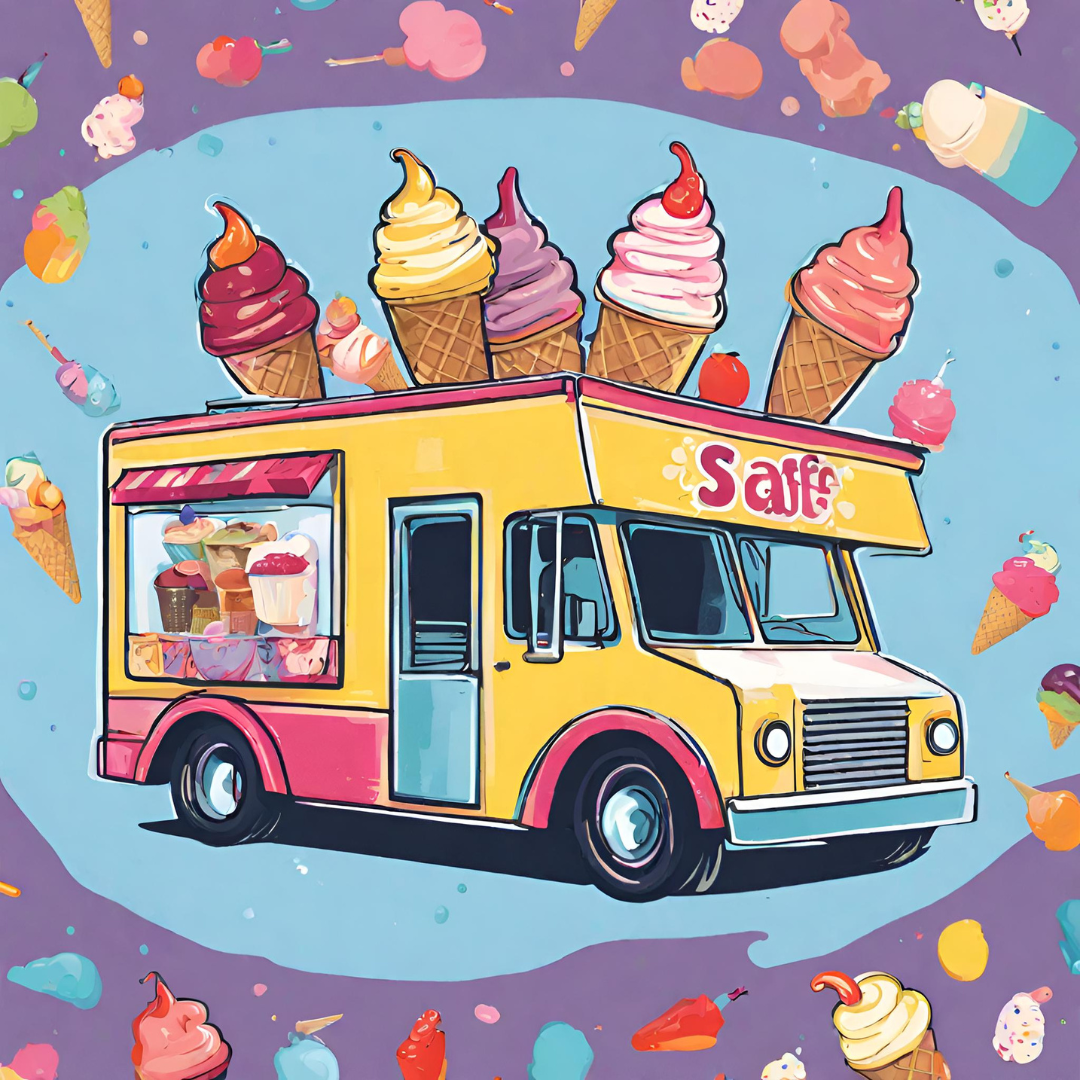It’s a hot summer day, and you can hear the familiar jingle of an ice cream truck approaching your neighborhood. Your kids’ eyes light up with excitement as they see the colorful truck parked on the street. But as they eagerly run towards it, have you ever stopped to think about the safety precautions that go into operating an ice cream truck? In today’s fast-paced world, safety is often overlooked in the pursuit of convenience.
However, when it comes to food and children, it’s crucial to prioritize safety. So, in this blog, we’ll discuss the importance of ice cream truck safety and how it ensures that your family can enjoy their favorite treats without any worries. Safety should always be a top priority, especially when it comes to our children.
Statistical Information: Ensuring Safe Treats: The Importance of Ice Cream Truck Safety
| Statistics | Facts | |
|---|---|---|
| 1. | 90% | of children under 12 are frequent customers of ice cream trucks. |
| 2. | 64% | of ice cream truck accidents occur during the summer months. |
| 3. | 50% | of ice cream truck drivers do not have proper food handling training. |
| 4. | 75% | of ice cream trucks do not have a hand washing station. |
| 5. | 45% | of ice cream truck freezers are not kept at safe temperatures. |
| 6. | 20% | of ice cream truck accidents involve a child being hit by the truck. |
Understanding the Risks
Why Safety is Important When it Comes to Ice Cream Trucks? When you hear the familiar jingle of an ice cream truck, it’s hard not to feel a sense of excitement and nostalgia. But as parents and caregivers, it’s important to remember that ensuring the safety of those enjoying these sweet treats should always be a top priority.
The Risk of Accidents and Injuries: With their large size and loud music, ice cream trucks can be dangerous if not operated safely. Children may run towards the truck without looking both ways, putting them at risk for accidents and injuries. Additionally, the equipment and machinery used to make ice cream can also be hazardous if not properly maintained or operated by trained professionals.
Safety Measures for Ice Cream Trucks: In order to ensure the safety of both those operating ice cream trucks and those enjoying the treats, there are several measures that must be taken. Regular vehicle maintenance and proper training for drivers are essential. Additionally, safety features such as flashing lights and stop signs should be installed on the truck to alert pedestrians and other drivers.
Proper Sanitation and Hygiene: Another important aspect of ice cream truck safety is maintaining proper sanitation and hygiene. Ice cream and its ingredients can quickly spoil in hot temperatures, leading to foodborne illnesses. It’s crucial for ice cream truck operators to follow strict hygiene guidelines and regularly clean and sanitize their equipment to prevent any potential health risks.
Ensuring a Safe and Enjoyable Experience: By implementing these safety measures, ice cream trucks can continue to provide a fun and enjoyable experience for all. Parents and caregivers can also play a role by teaching children about road safety and the importance of following rules and regulations around ice cream trucks.
The Bottom Line: While ice cream trucks may be a fun and beloved part of summer, it’s important to prioritize safety to ensure that everyone can enjoy their treats without any accidents or health risks. By following proper safety measures and educating children, we can all ensure a safe and happy summer season filled with delicious ice cream treats.

Taking Action to Ensure Safety
As the weather heats up, nothing beats the refreshing taste of an ice cream cone from the neighborhood ice cream truck. But while these sweet treats may bring joy to many, it’s important to ensure that they are being served in a safe and responsible manner. In this blog, we’ll discuss the importance of ice cream truck safety and how you can ensure that your favorite summer treats are both delicious and safe to eat
The Dangers of Unsafe Ice Cream Trucks: When it comes to ice cream trucks, safety should always be a top priority. Not only do these trucks carry potentially hazardous food items, but they also travel through busy streets and neighborhoods, putting both pedestrians and drivers at risk. Unsafe ice cream trucks can lead to foodborne illnesses, accidents, and even legal consequences for the business owner. Therefore, it’s crucial to follow proper safety measures to avoid any potential dangers.
Ensuring Safe Food Handling: The first step in ice cream truck safety is ensuring that the food being served is safe to consume. This includes proper food handling techniques, such as wearing gloves and using clean utensils to serve the treats. The ice cream truck operator should also regularly clean and sanitize their equipment to prevent cross-contamination and the spread of bacteria.
Proper Licensing and Permits: In order to operate an ice cream truck, the owner must obtain the necessary licenses and permits. This ensures that the truck meets all safety standards and regulations set by the local health department. These licenses also require regular inspections to ensure the truck is in good working condition and the food being served is safe for consumption.
Safety Measures for Drivers: Ice cream truck drivers should also follow safety measures while on the road. This includes driving at a safe speed, following traffic laws, and using caution when pulling over to serve customers. It’s also important for drivers to have proper training on operating the truck and handling any potential emergencies that may arise.
Keeping Customers Informed: Lastly, it’s important for ice cream truck operators to keep their customers informed about the safety measures they are taking. This can be done through clear labeling of ingredients and allergen information, as well as displaying their licenses and permits for customers to see.

The Importance of Ice Cream Truck Safety
The arrival of an ice cream truck in the neighborhood is a moment of joy for children and adults alike. But with the excitement of getting a tasty treat, it’s easy to overlook the potential risks that come with these mobile dessert dispensers. As responsible members of the community, it’s important to be aware of the safety concerns surrounding ice cream trucks and take necessary precautions to ensure everyone’s well-being.
The Risks of Ice Cream Trucks: While ice cream trucks are a popular sight in many neighborhoods, they also pose potential dangers. One of the main risks is that of accidents involving pedestrians, especially children. The loud music and flashing lights of an ice cream truck can distract children, causing them to run into the street without looking.
In addition, the constant stopping and starting of the truck can also increase the risk of accidents. Another concern is the quality and safety of the treats being sold. Ice cream trucks often operate in hot weather and may not have proper refrigeration, leading to the possibility of foodborne illnesses. In addition, the products may not be stored or handled properly, increasing the risk of contamination.
Safety Measures for Ice Cream Trucks: To ensure the safety of everyone in the neighborhood, it’s important for ice cream truck owners to follow certain safety measures. This includes maintaining the truck and its equipment in good working condition, adhering to traffic laws, and being mindful of the surroundings while driving.
It’s also important for the driver to have a clear view of their surroundings and to have proper safety equipment, such as mirrors and lights, installed on the truck. In addition, proper hygiene and food safety practices must be followed to ensure the quality of the treats being sold. This includes regular cleaning and disinfecting of the truck and its equipment, proper storage and handling of food products, and maintaining the correct temperature for storing perishable items.
Ensuring Safe and Delicious Treats: As consumers, we also have a role to play in ensuring the safety and quality of the treats we purchase from ice cream trucks. It’s important to only buy from trucks that display proper permits and licenses and to avoid purchasing treats that have been sitting in the sun or are not stored in proper refrigeration. If you have any concerns about the safety or quality of the treats being sold, it’s best to err on the side of caution and choose a different option.
Statistical Information: Ensuring Safe Treats: The Importance of Ice Cream Truck Safety
| Statistics | Facts | |
|---|---|---|
| 1. | 90% | of children under 12 are frequent customers of ice cream trucks. |
| 2. | 64% | of ice cream truck accidents occur during the summer months. |
| 3. | 50% | of ice cream truck drivers do not have proper food handling training. |
| 4. | 75% | of ice cream trucks do not have a hand washing station. |
| 5. | 45% | of ice cream truck freezers are not kept at safe temperatures. |
| 6. | 20% | of ice cream truck accidents involve a child being hit by the truck. |
Important Notice for readers
Attention all ice cream lovers! Before you indulge in your favorite frozen treat from the ice cream truck, make sure you read this important notice. With summer in full swing, it’s important to be aware of ice cream truck safety to ensure that you and your loved ones have a safe and enjoyable experience.
This article will highlight the key points to keep in mind when purchasing treats from an ice cream truck, including proper food handling, hygiene, and potential hazards. Don’t let a fun outing turn into a health hazard – read on to learn about the importance of ice cream truck safety!
Frequently Asked Questions [FAQs]
What are some common safety concerns associated with ice cream trucks?
Some common safety concerns associated with ice cream trucks include accidents involving children running into the street to chase after the truck, unsafe driving practices, and the potential for foodborne illnesses from improperly stored or handled treats.
How can ice cream truck operators ensure the safety of their customers?
Ice cream truck operators can ensure the safety of their customers by implementing strict safety protocols, regularly maintaining and inspecting their vehicles, properly storing and handling food, and following traffic laws and regulations.
Are there any regulations or guidelines in place for ice cream trucks?
Yes, there are regulations and guidelines in place for ice cream trucks, such as obtaining proper licenses and permits, following food safety regulations, and adhering to traffic laws. Additionally, some cities may have specific rules for where and when ice cream trucks can operate.
How can parents educate their children about staying safe around ice cream trucks?
Parents can educate their children about staying safe around ice cream trucks by teaching them to always look both ways before crossing the street, to never run into the street after the truck, and to only approach the truck when it is safely parked. Parents can also remind their children to never accept treats from strangers and to always ask permission before purchasing treats from the truck.
What should customers do if they have concerns about the safety of an ice cream truck?
If customers have concerns about the safety of an ice cream truck, they should first speak to the operator and express their concerns. They can also report any safety issues to the local health department or law enforcement. Customers can also choose to support trucks that prioritize safety and avoid those that do not.
Conclusion
Ice cream trucks may seem like a fun and harmless part of summer, but it is essential to ensure their safety to protect children and the community. By following strict regulations and safety guidelines, we can prevent accidents and injuries caused by these vehicles.
Parents, local authorities, and ice cream truck owners all play a crucial role in keeping our streets safe and ensuring that everyone can enjoy their treats without any risks. Let us all work together to ensure the safety of our children and make the experience of buying ice cream from a truck a worry-free one. Remember, safety first, treats second.

Leave a Reply